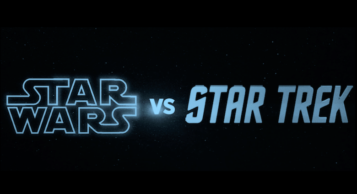
Star Wars or Star Trek has long been discussed in every corner of the galaxy, but in this post, we will explore why Star Wars is better and why Star Trek was better. Before we boldly go where no man has gone before, before we have been in a galaxy far, far away, we will hear why the two biggest science fiction franchises are better than both.
The science-fiction world is dominated by Star Wars and Star Trek, two of the most popular franchises of all time. The latter two first appeared in the 1970s, while the former debuted in cinemas a decade later. I assure you that there is something that satisfies many types of fans, and I am sure you will.
For the casual filmmaker, there is not much difference between the sci-fi franchises launched on television in 1966 and Star Wars, which debuted on the big screen in 1977. While devoted fans on both sides of the debate argue over which franchise is better, others measure it by history, technology, spaceships, and characters. The debate about which of these franchises is superior began a long time ago: which stories, technologies, spaceships, or characters were superior?
But for hardcore fans, the differences are as significant as tribbles and droids, and Star Trek fans are just as passionate about their favorite series as Star Wars fans. It’s only logical that a Star Wars fan would feel a little indignant about the much easier way Star Wars seems to go. If Star Wars completely destroys the box office, many Trek fans will be angry that their favorite series does not receive the same respect and admiration from the mainstream media.
And Star Wars fans, for their part, don’t like their beloved franchise being belittled by people who loved a show that was canceled after three seasons.
Personally, I do not support the idea that there is something wrong with pitting two equally impressive franchises (Star Wars and Star Trek) against each other, but there is no need to compare the two fiction series or analyze how they came into being. It just means that Star Wars as a franchise is as much a part of our culture as the show it was created for.
So maybe Star Trek is blessed to live in the same universe like Star Wars for so long, but that doesn’t mean it’s the poster child of science fiction – for the mainstream, we should all be masters of Star Wars fans. Perhaps we will come to terms with the fact that there is no poster in our mainstream – no child for science fiction.
Conventional wisdom holds that you can be both a Star Trek and a Star Wars fan, but mixing both is like mixing matter and antimatter. If anything, it just means that one of these two science fiction giants is held back by a fear that, as we all know, leads to the dark side. And that is well deserved, because mixing them is just as much science fiction, if not more, than mixing matter or antimatter, and it is only a little more dangerous.
I’m not sure that’s true, but if you can’t change the laws of physics, these two acclaimed science fiction series can create their own open-source multiverses and influence the open-source universe.
Fans, for example, have used the original Star Trek to create fan movies, cartoons and games. One of the most notable fan creations is the web series “Star Trek: The Continues,” which faithfully adapts Gene Roddenberry’s universe and distributes it worldwide. Abrams’ Star Fleet movies were made to remain true to classic Trek mythology, while he still remains true to his original source material, if not more so.
Time will tell whether Episode IX is an improvement on “The Force Awakens,” but after the mess of “Last Jedi,” it’s unlikely. Leave it to the brilliant Star Wars director J.J. Abrams and his team of writers and directors.
While Star Wars is fully invented, Star Trek is based on reality, and Lucas also acknowledged that both “Star Wars” and “Star Trek” affect many millions of people. He doesn’t think much of fan-based competitiveness, noting, “I couldn’t even imagine what would happen if you put the Enterprise on the Millennium Falcon.
William Shatner attributed the existence of the film and subsequent projects to the popularity of Star Wars, but not to the Star Trek franchise.
Universal Studios first agreed to shoot George Lucas’ Star Wars in 1971, but it took several years and several script revisions before the project began. The original film was eventually released in 1977 to worldwide fanfare and became a pop culture phenomenon. Phase II television project, from which the TV series Star Trek finally emerged: The Next Generation and Star Wars: Episode VII s start ended, as already mentioned, at the end of the first movie and not at the beginning of Phase III.
